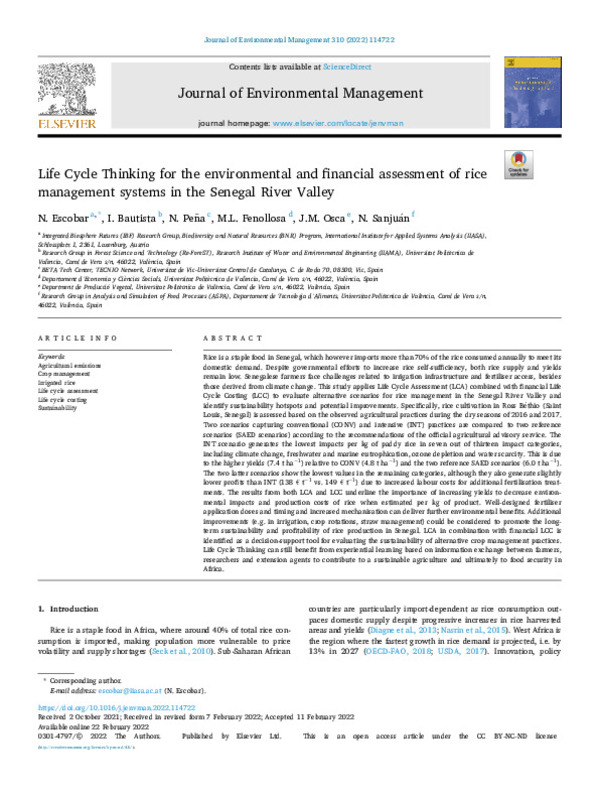JavaScript is disabled for your browser. Some features of this site may not work without it.
Buscar en RiuNet
Listar
Mi cuenta
Estadísticas
Ayuda RiuNet
Admin. UPV
Life Cycle Thinking for the environmental and financial assessment of rice management systems in the Senegal River Valley
Mostrar el registro sencillo del ítem
Ficheros en el ítem
| dc.contributor.author | Escobar, N.
|
es_ES |
| dc.contributor.author | Bautista, Inmaculada
|
es_ES |
| dc.contributor.author | Peña, N.
|
es_ES |
| dc.contributor.author | Fenollosa Ribera, M. Loreto
|
es_ES |
| dc.contributor.author | Osca Lluch, José María
|
es_ES |
| dc.contributor.author | Sanjuán Pellicer, María Nieves
|
es_ES |
| dc.date.accessioned | 2023-05-26T18:02:10Z | |
| dc.date.available | 2023-05-26T18:02:10Z | |
| dc.date.issued | 2022-05-15 | es_ES |
| dc.identifier.issn | 0301-4797 | es_ES |
| dc.identifier.uri | http://hdl.handle.net/10251/193649 | |
| dc.description.abstract | [EN] Rice is a staple food in Senegal, which however imports more than 70% of the rice consumed annually to meet its domestic demand. Despite governmental efforts to increase rice self-sufficiency, both rice supply and yields remain low. Senegalese farmers face challenges related to irrigation infrastructure and fertiliser access, besides those derived from climate change. This study applies Life Cycle Assessment (LCA) combined with financial Life Cycle Costing (LCC) to evaluate alternative scenarios for rice management in the Senegal River Valley and identify sustainability hotspots and potential improvements. Specifically, rice cultivation in Ross Be & PRIME;thio (Saint Louis, Senegal) is assessed based on the observed agricultural practices during the dry seasons of 2016 and 2017. Two scenarios capturing conventional (CONV) and intensive (INT) practices are compared to two reference scenarios (SAED scenarios) according to the recommendations of the official agricultural advisory service. The INT scenario generates the lowest impacts per kg of paddy rice in seven out of thirteen impact categories, including climate change, freshwater and marine eutrophication, ozone depletion and water scarcity. This is due to the higher yields (7.4 t ha(-1)) relative to CONV (4.8 t ha(-1)) and the two reference SAED scenarios (6.0 t ha(-1)). The two latter scenarios show the lowest values in the remaining categories, although they also generate slightly lower profits than INT (138 euro t(-1) vs. 149 euro t(-1)) due to increased labour costs for additional fertilisation treatments. The results from both LCA and LCC underline the importance of increasing yields to decrease environ -mental impacts and production costs of rice when estimated per kg of product. Well-designed fertiliser application doses and timing and increased mechanisation can deliver further environmental benefits. Additional improvements (e.g. in irrigation, crop rotations, straw management) could be considered to promote the long -term sustainability and profitability of rice production in Senegal. LCA in combination with financial LCC is identified as a decision-support tool for evaluating the sustainability of alternative crop management practices. Life Cycle Thinking can still benefit from experiential learning based on information exchange between farmers, researchers and extension agents to contribute to a sustainable agriculture and ultimately to food security in Africa. | es_ES |
| dc.description.sponsorship | Authors acknowledge the Office of Development Cooperation of the Universitat Politecnica de Valencia (CCD-UPV) for providing funds as part of the project AD1511-UPV. Authors also thank the support of Caritas Spain (especially Vittoria Garoffalo, Soledad Gutierrez, and Pablo Reyero) and Caritas Senegal (especially Alex Tendeng, Andre Diarigne Sene and Michael Diedhiou) for facilitating its implementation. | es_ES |
| dc.language | Inglés | es_ES |
| dc.publisher | Elsevier | es_ES |
| dc.relation.ispartof | Journal of Environmental Management | es_ES |
| dc.rights | Reconocimiento - No comercial - Sin obra derivada (by-nc-nd) | es_ES |
| dc.subject | Agricultural emissions | es_ES |
| dc.subject | Crop management | es_ES |
| dc.subject | Irrigated rice | es_ES |
| dc.subject | Life cycle assessment | es_ES |
| dc.subject | Life cycle costing | es_ES |
| dc.subject | Sustainability | es_ES |
| dc.subject.classification | TECNOLOGIA DE ALIMENTOS | es_ES |
| dc.subject.classification | ECONOMIA, SOCIOLOGIA Y POLITICA AGRARIA | es_ES |
| dc.subject.classification | PRODUCCION VEGETAL | es_ES |
| dc.title | Life Cycle Thinking for the environmental and financial assessment of rice management systems in the Senegal River Valley | es_ES |
| dc.type | Artículo | es_ES |
| dc.identifier.doi | 10.1016/j.jenvman.2022.114722 | es_ES |
| dc.relation.projectID | info:eu-repo/grantAgreement/UPV//AD1511-UPV//Centro de Cooperación al Desarrollo (CCD-UPV)/ | es_ES |
| dc.rights.accessRights | Abierto | es_ES |
| dc.contributor.affiliation | Universitat Politècnica de València. Escuela Técnica Superior de Ingeniería Agronómica y del Medio Natural - Escola Tècnica Superior d'Enginyeria Agronòmica i del Medi Natural | es_ES |
| dc.description.bibliographicCitation | Escobar, N.; Bautista, I.; Peña, N.; Fenollosa Ribera, ML.; Osca Lluch, JM.; Sanjuán Pellicer, MN. (2022). Life Cycle Thinking for the environmental and financial assessment of rice management systems in the Senegal River Valley. Journal of Environmental Management. 310:1-15. https://doi.org/10.1016/j.jenvman.2022.114722 | es_ES |
| dc.description.accrualMethod | S | es_ES |
| dc.relation.publisherversion | https://doi.org/10.1016/j.jenvman.2022.114722 | es_ES |
| dc.description.upvformatpinicio | 1 | es_ES |
| dc.description.upvformatpfin | 15 | es_ES |
| dc.type.version | info:eu-repo/semantics/publishedVersion | es_ES |
| dc.description.volume | 310 | es_ES |
| dc.identifier.pmid | 35217446 | es_ES |
| dc.relation.pasarela | S\455647 | es_ES |
| dc.contributor.funder | Universitat Politècnica de València | es_ES |
| dc.subject.ods | 02.- Poner fin al hambre, conseguir la seguridad alimentaria y una mejor nutrición, y promover la agricultura sostenible | es_ES |
| dc.subject.ods | 08.- Fomentar el crecimiento económico sostenido, inclusivo y sostenible, el empleo pleno y productivo, y el trabajo decente para todos | es_ES |
| dc.subject.ods | 12.- Garantizar las pautas de consumo y de producción sostenibles | es_ES |








